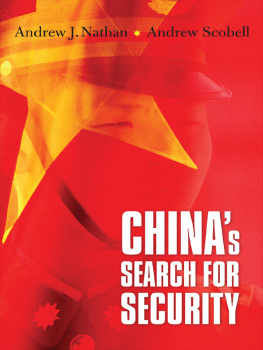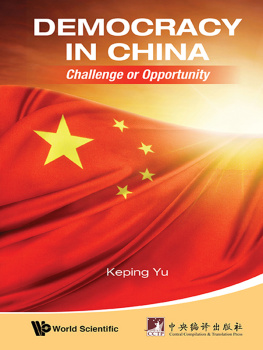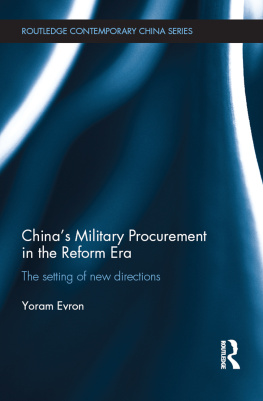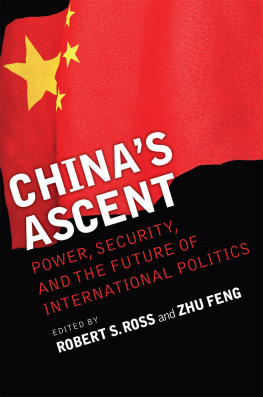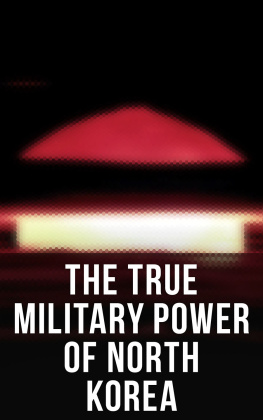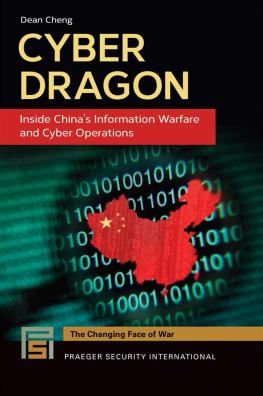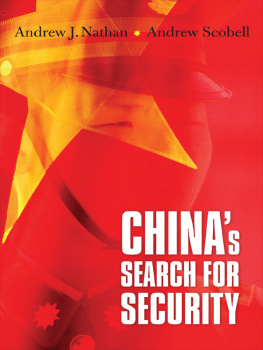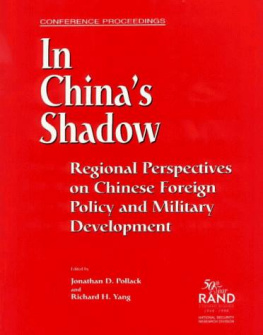CHINAS SEARCH FOR SECURITY

Columbia University Press
Publishers Since 1893
New York Chichester, West Sussex
cup.columbia.edu
Copyright 2012 Andrew J. Nathan and Andrew Scobell
All rights reserved
E-ISBN 978-0-231-51164-3
The authors and Columbia University Press wish to thank Robert S. Ross for permission to use material that originally appeared in this books first edition, The Great Wall and the Empty Fortress.
Library of Congress Cataloging-in-Publication Data
Nathan, Andrew J. (Andrew James)
Chinas search for security / Andrew J. Nathan and Andrew Scobell.
p. cm
Includes bibliographical references and index.
ISBN 978-0-231-140508 (cloth : alk. paper)ISBN 978-0-231-51164-3 (ebook)
1. ChinaForeign relations19492. National security-China. I. Scobell, Andrew. II. Title.
JZ1734.N37 2012
355'.033551dc23
2012009156
Cover images: Alamy Cover design: Lisa Hamm
Book Design: Lisa Hamm
Frontispiece: China and Its Neighbors
A Columbia University Press E-book.
CUP would be pleased to hear about your reading experience with this e-book at .
References to Internet Web sites (URLs) were accurate at the time of writing. Neither the authors nor Columbia University Press are responsible for URLs that may have expired or changed since the manuscript was prepared.
Dedicated to the memory of our fathers
Paul S Nathan, 19132009
Charles L. Scobell, 19262009
CONTENTS
| ANZUS | Australia, New Zealand, United States Alliance |
| ARATS | Association for Relations Across the Taiwan Strait |
| ASEAN | Association of Southeast Asian Nations |
| CCP | Chinese Communist Party |
| CENTCOM | U.S. Central Command |
| CIA | U.S. Central Intelligence Agency |
| CLSG | central leading small group |
| CMC | Central Military Commission |
| DPP | Democratic Progressive Party |
| DPRK | Democratic Peoples Republic of Korea |
| EEZ | Exclusive Economic Zones |
| FBI | U.S. Federal Bureau of Investigation |
| GDP | gross domestic product |
| IAEA | International Atomic Energy Agency |
| ICBM | intercontinental ballistic missile |
| IMF | International Monetary Fund |
| KEDO | Korean Peninsula Energy Development Organization |
| KMT | Kuomintang, Nationalist Party |
| MOOTW | Military Operations Other Than War |
| MR | military region |
| MSG | Military Strategic Guidelines |
| NATO | North Atlantic Treaty Organization |
| NCO | noncommissioned officer |
| NGO | nongovernmental organization |
| NPC | National Peoples Congress |
| NPT | Nuclear Nonproliferation Treaty |
| NSC | U.S. National Security Council |
| ODA | official development assistance |
| PACOM | U.S. Pacific Command |
| PAP | Peoples Armed Police |
| PBSC | Politburo Standing Committee |
| PLA | Peoples Liberation Army |
| PRC | Peoples Republic of China |
| ROC | Republic of China |
| ROK | Republic of Korea |
| SASTIND | State Administration for Science, Technology, and Industry for National Defense |
| SCO | Shanghai Cooperation Organization |
| SDF | Self-Defense Forces |
| SEATO | Southeast Asia Treaty Organization |
| SEF | Straits Exchange Foundation |
| TAR | Tibet Autonomous Region |
| TRA | Taiwan Relations Act |
| UDHR | Universal Declaration of Human Rights |
| UN | United Nations |
| UNCLOS | United Nations Convention on the Law of the Sea |
| WHO | World Health Organization |
| WTO | World Trade Organization |
Chinas Search for Security grew out of a previous work called The Great Wall and the Empty Fortress, which was published in 1997. We set out to produce a revised and updated edition of that book, but Chinas position in the world has changed so much that we ended up with what is almost entirely a new book. The analytical approach remains the same: we look at Chinas security problems from the Chinese point of view in order to analyze how Chinese policymakers have tried to solve them. The basic conclusion also stands: China is too bogged down in the security challenges within and around its borders to threaten the West unless the West weakens itself to the point of creating a power vacuum.
In other respects, however, Chinas position in the world has changed. In 1997, it was a vulnerable country, fielding a foreign policy that was mainly defensive and aimed at preventing domestic instability, avoiding the loss of historically held territories such as Taiwan and Tibet, and reconstructing strained relations with potentially threatening powerful neighbors such as Japan, Russia, and India. It had no major interests or significant means of influence in parts of the world beyond its immediate periphery. It was not an actor of consequence in Europe, North or South America, Africa, or the Middle East.
That century has arrived, and China has fulfilled its intention. Great power is a vague term, but China deserves it by any measure: the extent and strategic location of its territory, the size and dynamism of its population, the value and growth rate of its economy, its massive share of global trade, the size and sophistication of its military, the reach of its diplomatic interests, and its level of cultural influence. It has become one of a small number of countries that have significant national interests in every part of the worldoften driven by the search for resourcesand whose voice must be heard in the solution of every global problem. It is one of the few countries that command the attention, whether willingly or grudgingly, of every other country and every international organization. It is the only country widely seen as a possible threat to U.S. predominance.
It is easy to forget that Chinas rise was what the West wanted. Richard Nixon laid the groundwork for the policy of engagement by arguing in 1967, [W]e simply cannot afford to leave China forever outside the family of nations, there to nurture its fantasies, cherish its hates and threaten its neighbors. There is no place on this small planet for a billion of its potentially most able people to live in angry isolation. He launched the engagement policy with his historic visit to China in 1972. Every American president since then has stated that the prosperity and stability of China are in the interest of the United States.

